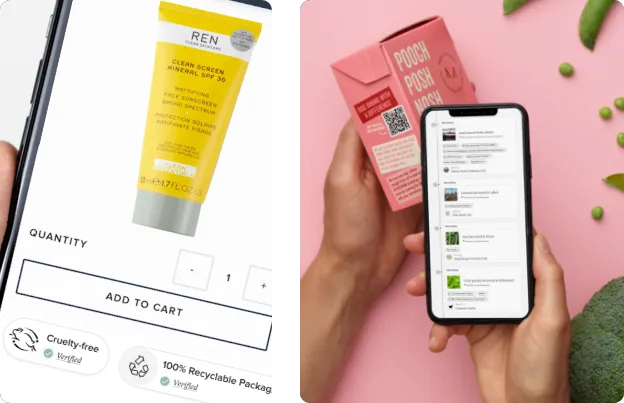Cult Beauty is increasing purchase conversion and customer sentiment by integrating validated sustainability claims at key touchpoints in the customer journey.

+31% higher conversion rate
+17% higher add-to-cart rate
+5% increase in post-purchase shopper sentiment
110+ participating brands and 2,000+ products

When 23,000 Cult Beauty shoppers shared in a survey that transparency was a priority when shopping for beauty online, the Cult Beauty team knew they had to keep innovating to maintain the brand's status as a trusted e-commerce retailer. Cult Beauty is one of the UK's fastest-growing online beauty businesses, selling more than 300 brands and operating internationally. But protecting long term value relied on clearly communicating social and environmental impact information to shoppers. By doing so, Cult Beauty also aimed to grow the market for truly sustainable brands and help establish benchmarks for new brands joining the retailer.
Cult Beauty is harnessing validated sustainability claims data to boost visibility, traffic and conversion for participating brands, at strategic moments in the customer journey.
Using Provenance’s Proof Point data, Cult Beauty has delivered its highly successful Cult Conscious edit and beauty box, configured values-based search filters and enhanced PDPs with conversion-optimised sustainability content.
By connecting participating brands with conscious shoppers, the fast-growing retailer is not only empowering their customers to make informed purchases, but powerfully rewarding brands for their transparency and sustainability commitments.
.png)


Cult Beauty drove improved post-purchase shopper sentiment by 5% (according to a survey of 23k customers) by publishing transparent, validated sustainability claims.
By leveraging sustainability on product pages and in supporting Cult Conscious marketing campaigns, brands with Proof Points saw higher purchase rates.
Provenance's scalable sustainability claims management platform has cut the time the retailer spent vetting social and environmental impact claims across the portfolio.

“We are always looking for ways to empower our customers by providing the information they need. Provenance provides next-generation proof-point transparency, allowing consumers to do their due diligence around brand claims.”
Alexia Inge
Former Co-founder & Co-CEO, Cult Beauty

Cult Beauty drove improved post-purchase shopper sentiment by 5% (according to a survey of 23k customers) by publishing transparent, validated sustainability claims.
By leveraging sustainability on product pages and in supporting Cult Conscious marketing campaigns, brands with Proof Points saw higher purchase rates.
Provenance's scalable sustainability claims management platform has cut the time the retailer spent vetting social and environmental impact claims across the portfolio.

